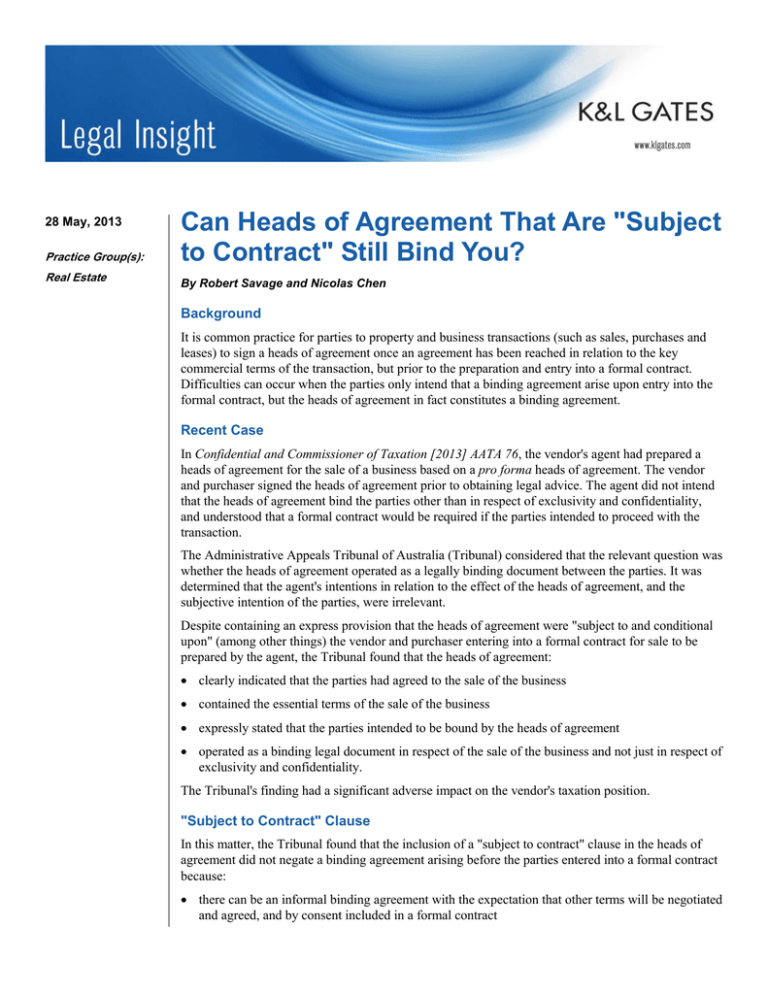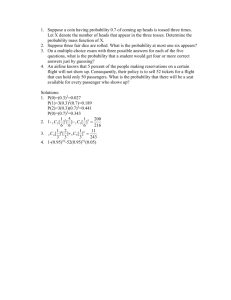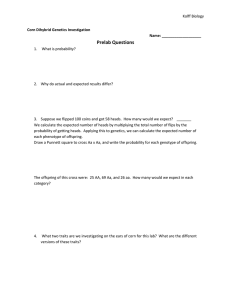
Practice Group(s):
Can Heads of Agreement That Are "Subject
to Contract" Still Bind You?
Real Estate
By Robert Savage and Nicolas Chen
28 May, 2013
Background
It is common practice for parties to property and business transactions (such as sales, purchases and
leases) to sign a heads of agreement once an agreement has been reached in relation to the key
commercial terms of the transaction, but prior to the preparation and entry into a formal contract.
Difficulties can occur when the parties only intend that a binding agreement arise upon entry into the
formal contract, but the heads of agreement in fact constitutes a binding agreement.
Recent Case
In Confidential and Commissioner of Taxation [2013] AATA 76, the vendor's agent had prepared a
heads of agreement for the sale of a business based on a pro forma heads of agreement. The vendor
and purchaser signed the heads of agreement prior to obtaining legal advice. The agent did not intend
that the heads of agreement bind the parties other than in respect of exclusivity and confidentiality,
and understood that a formal contract would be required if the parties intended to proceed with the
transaction.
The Administrative Appeals Tribunal of Australia (Tribunal) considered that the relevant question was
whether the heads of agreement operated as a legally binding document between the parties. It was
determined that the agent's intentions in relation to the effect of the heads of agreement, and the
subjective intention of the parties, were irrelevant.
Despite containing an express provision that the heads of agreement were "subject to and conditional
upon" (among other things) the vendor and purchaser entering into a formal contract for sale to be
prepared by the agent, the Tribunal found that the heads of agreement:
clearly indicated that the parties had agreed to the sale of the business
contained the essential terms of the sale of the business
expressly stated that the parties intended to be bound by the heads of agreement
operated as a binding legal document in respect of the sale of the business and not just in respect of
exclusivity and confidentiality.
The Tribunal's finding had a significant adverse impact on the vendor's taxation position.
"Subject to Contract" Clause
In this matter, the Tribunal found that the inclusion of a "subject to contract" clause in the heads of
agreement did not negate a binding agreement arising before the parties entered into a formal contract
because:
there can be an informal binding agreement with the expectation that other terms will be negotiated
and agreed, and by consent included in a formal contract
Can Heads of Agreement That Are "Subject to Contract"
Still Bind You?
the formal contract was simply intended to restate the terms set out in the heads of agreement in a
fuller and more precise form but not different in effect, and the parties had intended to substitute
the formal contract for the heads of agreement.
The heads of agreement fell within the well-established legal categories of agreements that, although
being stated to be "subject to contract", were nevertheless binding.
Lessons
Heads of agreement should clearly state whether they are intended to be binding on the parties.
There are traps in using pro forma documents and it is always prudent to have such agreements
legally reviewed before signing them.
If the intent of the parties is to provide a prospective purchaser with a due diligence exclusivity
period, then it might be sufficient to simply document that arrangement by a confidentiality
agreement.
Authors:
Robert Savage
robert.savage@klgates.com
+61 2 9513 2429
Nicolas Chen
nicolas.chen@klgates.com
+61 2 9513 2422
Anchorage Austin Beijing Berlin Boston Brisbane Brussels Charleston Charlotte Chicago Dallas Doha Dubai Fort Worth Frankfurt
Harrisburg Hong Kong Houston London Los Angeles Melbourne Miami Milan Moscow Newark New York Orange County Palo Alto Paris
Perth Pittsburgh Portland Raleigh Research Triangle Park San Diego San Francisco São Paulo Seattle Seoul Shanghai Singapore Spokane
Sydney Taipei Tokyo Warsaw Washington, D.C. Wilmington
K&L Gates practices out of 48 fully integrated offices located in the United States, Asia, Australia, Europe, the
Middle East and South America and represents leading global corporations, growth and middle-market companies,
capital markets participants and entrepreneurs in every major industry group as well as public sector entities,
educational institutions, philanthropic organizations and individuals. For more information about K&L Gates or its
locations, practices and registrations, visit www.klgates.com.
This publication is for informational purposes and does not contain or convey legal advice. The information herein should not be used or relied upon in
regard to any particular facts or circumstances without first consulting a lawyer.
©2013 K&L Gates LLP. All Rights Reserved.
2







![2*V[X]=1/n2*np(1-p)=p(1-p)/n 1833.0 5.05.0 !8!6 !14 )6 ( = = = XP](http://s3.studylib.net/store/data/008711824_1-0d6d751ef61e41cbf10ab5a47ea15653-300x300.png)
